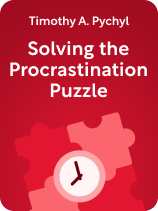

This article is an excerpt from the Shortform book guide to "Solving the Procrastination Puzzle" by Timothy A. Pychyl. Shortform has the world's best summaries and analyses of books you should be reading.
Like this article? Sign up for a free trial here.
Why do future rewards feel less important than current ones? How does instant gratification cause procrastination?
One of the reasons why we procrastinate is that we want to have experiences that our brains perceive as rewarding—experiences that feel good rather than bad. According to Timothy A. Pychyl, this tendency explains why we prefer being rewarded now, rather than later.
Find out how to overcome instant gratification, which will then help solve procrastination.
We Choose a Reward Now, Even if There Are Consequences Later
One way that your brain’s love of rewards causes procrastination ties into the insight that you often procrastinate so you can avoid confronting the uncomfortable emotions or thoughts that a task brings up. When you feel you’ve sidestepped negative feelings, at least temporarily, that can feel rewarding. Procrastination becomes a habit when you do this over and over again, establishing a pattern of avoiding tasks so you can feel rewarded now and deal with the costs of those decisions later. Luckily, there’s a way for you to learn how to overcome instant gratification.
(Shortform note: Many pieces of literature have dramatized the desire to put off responsibilities and emotions until later to do something more rewarding now. Ottessa Moshfegh’s 2018 novel My Year of Rest and Relaxation follows an unnamed character who’s miserable with her life in New York. She decides to run away from that misery by using prescription medication to sleep for a year, living on the money she inherited after her parents’ premature deaths, and waking up every three days to eat, bathe, and take another pill. Of course, few of us would go so far as to put off the work of building a life—or just being alive—for a year. But the novel illustrates just how hypnotic the lure of a temporary solution to a problem can be, despite the consequences.)
What to Do About It:
To keep your brain’s shortsighted desire for rewards from getting the better of you, Pychyl first recommends planning ahead for the moment you’ll feel the temptation to procrastinate. You can do this by making what psychologists call “predecisions.” As the name suggests, predecisions are decisions you can make before you find yourself in a challenging situation to smooth the path toward a better decision in the moment.
For example, you can make a predecision that if you catch yourself trying to put off going for a run, you’ll respond by getting up right away and putting on your running shoes. Deciding in advance about the timeline on which you’ll act and the specific part of the task you’ll tackle first can help you replace one habit—skipping your run because you don’t really want to go—with another habit—lacing up your shoes as soon as you catch yourself thinking you don’t want to go. Once your running shoes are on, you might as well get out the door, right?
(Shortform note: Predecisions sound great in theory, but what’s to keep you from throwing them out the window as soon as the moment comes? Win the Day author Mark Batterson advises that to use predecisions to improve at least a few of the 35,000 decisions you make every day, you should pair them with rituals. He explains that if you make a predecision to get out of bed as soon as your alarm goes off, then in theory, you eliminate the option of hitting snooze. But the key to actually making it happen is to build it into a ritual. For example, you might place your alarm clock across the room and establish a routine of rolling out of bed and making a cup of matcha each morning. Rituals create structure, which makes it easier to stick to the plan.)
A second strategy Pychyl recommends for resisting the reward of avoiding your negative emotions is determining which feelings prompt you to procrastinate. By noticing what goes through your head in those moments, you can learn to recognize specific emotions that make you want to put off a task and plan to deal with them, perhaps by making a predecision about what to do when you notice that familiar feeling. Pychyl notes that it can also be helpful to realize that you aren’t your emotions, and you don’t have to let temporary feelings dictate how you behave.
For example, you might realize you’re putting off working in your garden because you’re feeling annoyed about the gray weather. By acknowledging your irritation as a trigger for procrastination, you can make the predecision to deal with that feeling of annoyance by putting on your chore coat and getting to work instead of letting a gloomy day (or a gloomy mood) decide how you act.
(Shortform note: It’s not always easy to recognize what emotions you’re feeling. Experts refer to difficulty with recognizing your own emotions as “alexithymia,” and they estimate it affects as many as 1 in 10 people. Alexithymia sometimes occurs alongside mood disorders like depression or developmental differences like autism. People who have it seem to have difficulty interpreting physiological changes as emotional responses—for example, realizing that having a faster heart rate could mean they’re excited or frightened. To improve this ability, experts recommend tuning into your physiological responses. Paying attention to your heart rate, for example, can help you recognize the difference between emotions like anxiety and fear.)
Pychyl notes that predecisions are helpful not only for planning how you’ll react to emotions but also for building healthier responses to the excuses you use to justify procrastination. This means that you can decide ahead of time to turn your excuses for procrastination into triggers for more productive habits. For example, you can decide that when you catch yourself saying you’ll watch Netflix now and do your chores later because you’ve had a rough day at work, then you’ll get up and wash the dishes.
(Shortform note: While the excuses you make to justify your procrastination can feel compelling, they’re probably not very original—or very logical, when you start to look closely. One particularly common excuse is that you’re feeling too tired or stressed to tackle a task right away, and you’ll be more productive if you just do the work when you’re in a better mood. Fortunately, you can make a plan to handle this excuse by seeing through the logic: When you catch yourself rationalizing this way, remind yourself that you have no way of predicting whether your mood will be better later or tomorrow. You can also remember that making progress on an important or meaningful task will likely boost your mood anyway.)
We Care Less About Future Rewards Than Present Ones
A second way that the reward circuitry in your brain trips you up, says Pychyl, is by incentivizing you to pick a reward now over an even better reward later. While it would feel rewarding to finish a project or achieve a goal later, your brain wants you to instead choose a much smaller, more immediate reward, like a half-hour spent scrolling through TikTok videos you’ll immediately forget.
(Shortform note: Our love of immediate rewards is so strong that we procrastinate even when putting off a task means it’ll take a lot more work to do it later than it would be to get it done now—and we’re not the only animals to do it. Studies with pigeons have shown that when the birds can get food as a reward for pecking at a key, they prefer to delay that work, even when it takes four times as many pecks later as it would take now. Pigeons are impulsive, like humans. They prioritize how they feel in the short term—reluctant to get the task done—over what they’ll feel in the long term—reluctant to get an even more onerous version of the task done.)
Choosing a small reward now instead of a big reward later doesn’t quite make sense, so your brain also knows exactly how to convince you that your decision is sound. Pychyl points out that when you procrastinate, you know the decision to put off an important task doesn’t align with your values or goals. This means you experience cognitive dissonance: the uncomfortable tension that arises from holding two conflicting ideas in your mind at the same time. (For example, those conflicting ideas might be “I want to exercise more” and “I’m not going to run today.”) One way you resolve the tension and explain away the dissonance is by making excuses about why now isn’t the right time for the task—but tomorrow will be different.
(Shortform note: Pychyl is explaining one of the destructive ways we can cope with cognitive dissonance: rationalizing our lack of progress on a task. But sometimes, we find constructive ways to cope with cognitive dissonance, too, like using it to motivate ourselves to take action. In the 2023 film Barbie, Barbie experiences cognitive dissonance when her belief that the world is a feminist utopia conflicts with the reality that patriarchal societies oppress women. She tries to avoid the dissonance by returning to Barbieland, which has been taken over by Ken in the meantime. She wants the world to be perfect, and she briefly wants to give up. But she uses the cognitive dissonance as fuel to confront the contradictions and make Barbieland more equal for everyone.)
What to Do About It:
To stop prioritizing rewards in the present, Pychyl recommends a strategy that might help you use cognitive dissonance to get things done. When you catch yourself wanting to procrastinate, you can remind yourself how the task or project at hand will contribute to your goals and help you uphold your values. That way, you notice that while it would feel rewarding to kick back and relax now, you’ll feel even better if you accomplish your goal later. Connecting tasks to goals can help you see the dissonance between wanting to achieve your goal and choosing to do nothing. It can also help you remember that what you do today matters and make it easier to begin working rather than do nothing.
(Shortform note: While Pychyl states that both goals and values can drive your progress and prevent procrastination on everyday tasks, some other psychologists advise focusing on your values first. In The Happiness Trap, psychologist Russ Harris explains your values are principles that should determine how you act. To live according to your values, you have to be clear about what kind of person you want to be and what you care about most. Harris notes that values are continuous, not something to achieve once, so it’s crucial to translate your values into actionable goals. Then, as Pychyl advises, you can connect the goals you want to accomplish and the values you want to uphold to your daily tasks, reminding yourself why they’re worth working on.)

———End of Preview———
Like what you just read? Read the rest of the world's best book summary and analysis of Timothy A. Pychyl's "Solving the Procrastination Puzzle" at Shortform.
Here's what you'll find in our full Solving the Procrastination Puzzle summary:
- The real reason why you procrastinate
- How procrastination undermines your ability to live a happy, healthy life
- Practical advice for changing your relationship with your most dreaded tasks






